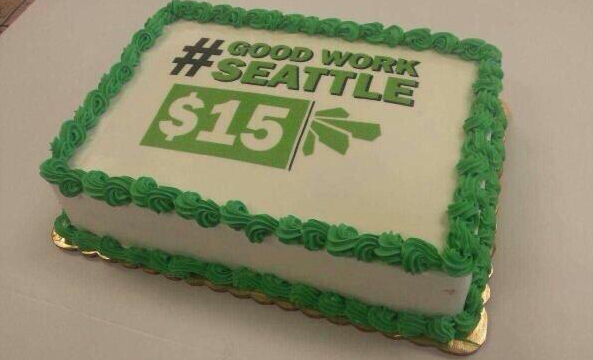Here are 4 new problems with Seattle’s $15-per-hour minimum wage

CAKE AND CIRCUSES: Hashtag cake is the best treat to consume after crashing an economy.
By Dustin Hurst | Northwest Watchdog
Shortly after passing a $15-per-hour minimum wage law, members of the Seattle City Council sauntered outside City Hall to celebrate the historic victory.
Some of them even grabbed a piece of cake to commemorate the big day. After all, cake is the perfect treat to consume after dooming an economy.
Can councilmembers have their cake and eat it, too? Probably not, and here are four reasons why:
1. It’s already the subject of a lawsuit
Minutes after the council voted 9-0 to approve the new wage, the International Franchise Association announced its plans to sue the city over the plan. The association feels the plan unfair because it treats small franchise owners the same as businesses that employ more than 500 workers. The group believes franchise owners shouldn’t be subjected to the more rapid and onerous regulations placed on larger businesses.
“The City Council’s action today is unfair, discriminatory and a deliberate attempt to achieve a political agenda at the expense of small franchise business owners,” IFA President Steve Caldeira said Monday. “By picking winners and losers among Seattle businesses, this policy flies in the face of all legal precedent and defies common sense.”
Seattle Subway franchise owner Matt Hollek only has three years to phase in the higher wage, as opposed to the seven years small businesses have.
2. Business are already looking at how to cope
Sure, the council can enact sweeping reforms to wage practices, but it cannot repeal basic principles of economics. When businesses are forced to pay wages higher than the market allows, employers will be forced to make tough choices — and cut hours, workers or business features.
Destiny Sund, owner of The Confectional, a small bakery in Seattle’s iconic Pike Place market, told Northwest Watchdog her company is already considering its options to save itself — even though the higher wage phases in through seven years.
“Time is ticking us closer to the tipping point,” Sund said. “We are toying with the idea of closing half our business and laying off six employees… We don’t want to do this — our checking account will decide for us. ”
Sund said the company is also looking at raising prices or adding a special surchage to orders to deal with the new wages.
Hollek plans to add $1 to the cost of each Subway sandwich and roll back health benefits for his eight workers.
3. The new law may not be extreme enough for Seattle’s socialist faction
At the tail end of the City Council meeting, two councilmembers lectured the audience, hungry for immediate implementation and removal of the training wage allowances for youth and disabled workers, that the new law was the result of compromise and that politics is the “art of the doable deal.”
Will Seattle’s socialist faction accept the law? No one is quite sure. Kshama Sawant, the socialist behind the $15-an-hour push, suggested she might launch a ballot initiative to force city employers to adopt the higher wage sooner and without training wages or a tip credit allowance.
Sawant, busy spiking the football, hasn’t signaled if that’s still the plan.
“It remains to be seen whether Socialist $15 Now and Councilmember Sawant will continue their efforts to put an even more extreme Charter Amendment on the ballot this November, which would supersede the city’s ordinance,” Max Nelson, a labor analyst for the Olympia-based Freedom Foundation, told Northwest Watchdog.org.
“As the plan gets phased in, the brunt of its weight will fall gradually but steadily on the smallest businesses and those workers most in need of jobs and experience. There is no doubt: the City Council’s vote is a loss for sound economics, good intentions and the people and businesses it will affect; it is a win only for demagogues on the far left seeking to radically restructure the American economy.”
4. There is no doubt: This will hurt workers
Kshama and crew — well-funded big labor unions — sold the plan on the idea it would help workers close the gap between the haves and the have-nots.
Has it worked in SeaTac, a tiny Seattle suburb that adopted $15 per hour months ago? It has not.
In a follow-up piece in the Asian Weekly, a handful of workers voiced this displeasure of the new wage’s unintended consequences:
“Are you happy with the $15 wage?” I asked the full-time cleaning lady.
“It sounds good, but it’s not good,” the woman said.
“Why?” I asked.
“I lost my 401k, health insurance, paid holiday, and vacation,” she responded. “No more free food,” she added.
The hotel used to feed her. Now, she has to bring her own food. Also, no overtime, she said. She used to work extra hours and received overtime pay.
What else? I asked.
“I have to pay for parking,” she said.
Another SeaTac worker, a waitress, said her tips dropped sharply after the new wage law took effect.
Contact: Dustin@Watchdog.org







